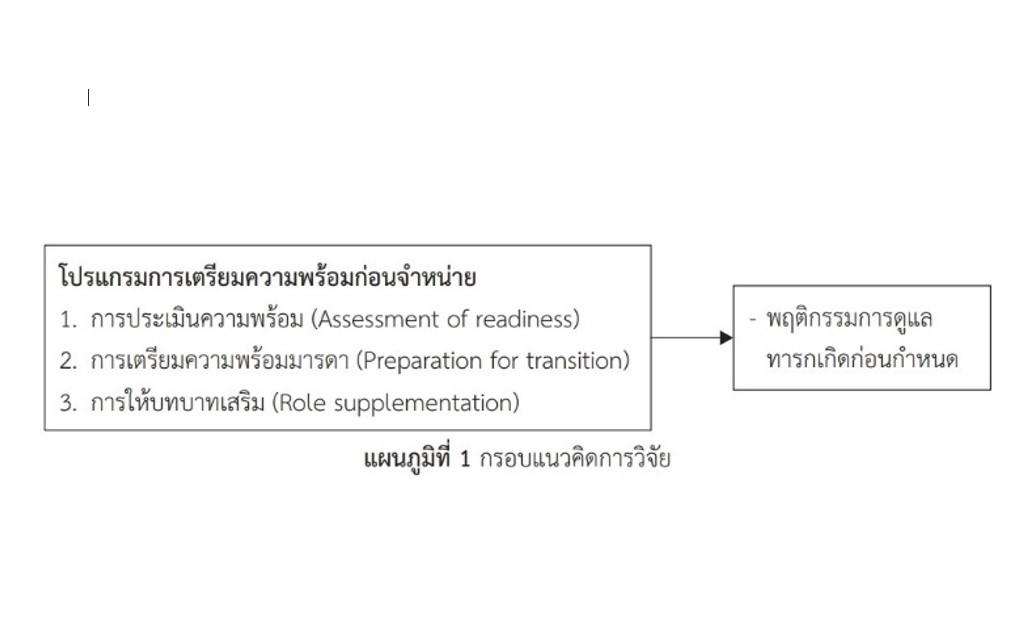ผลของโปรแกรมการเตรียมมารดาต่อพฤติกรรมการดูแลทารกเกิดก่อนกำหนดในระยะเปลี่ยนผ่านจากโรงพยาบาลสู่บ้าน
คำสำคัญ:
โปรแกรมการเตรียมมารดา , พฤติกรรมการดูแลทารกเกิดก่อนกำหนด , ระยะเปลี่ยนผ่านบทคัดย่อ
การวิจัยกึ่งทดลองนี้ มีวัตถุประสงค์เพื่อศึกษาผลของโปรแกรมการเตรียมมารดาต่อพฤติกรรมการดูแลทารกเกิดก่อนกำหนดในระยะเปลี่ยนผ่านจากโรงพยาบาลสู่บ้าน กลุ่มตัวอย่าง เป็นมารดาครรภ์แรกและทารกเกิดก่อนกำหนดที่เข้ารับการรักษาในโรงพยาบาลธรรมศาสตร์เฉลิมพระเกียรติ จำนวน 30 ราย คัดเลือกกลุ่มตัวอย่างตามคุณสมบัติที่กำหนด และทำการสุ่มอย่างง่าย เข้ากลุ่มทดลองและกลุ่มควบคุม กลุ่มละ 15 คน กลุ่มทดลองได้รับโปรแกรมการเตรียมมารดา กลุ่มควบคุมได้รับการพยาบาลปกติ เครื่องมือที่ใช้ในการทดลองได้เเก่ โปรแกรมการเตรียมมารดา เครื่องมือที่ใช้ในการเก็บรวบรวมข้อมูล ได้แก่ แบบบันทึกข้อมูลทั่วไป เเละแบบสอบถามพฤติกรรมการดูแลทารกเกิดก่อนกำหนด ซึ่งมีค่าความเชื่อมั่น เท่ากับ .89 วิเคราะห์ข้อมูลโดยใช้สถิติพรรณนา และทดสอบค่าที
ผลการวิจัยพบว่า ภายหลังการทดลองมารดากลุ่มทดลองมีคะแนนเฉลี่ยพฤติกรรมการดูแลทารกเกิดก่อนกำหนดสูงกว่ามารดากลุ่มควบคุม เเละสูงกว่าก่อนได้รับโปรเเกรมอย่างมีนัยสำคัญทางสถิติ (p < .001) จากผลการวิจัยมีข้อเสนอแนะว่า พยาบาลสามารถนำโปรแกรมนี้ไปประยุกต์ใช้กับมารดาทารกเกิดก่อนกำหนดในระยะเปลี่ยนผ่านจากโรงพยาบาลสู่บ้าน
เอกสารอ้างอิง
Aagaard, H., Uhrenfeldt, L., Spliid, M., & Fegran, L. (2015). Parents' experiences of transition when their infants are discharged from the neonatal intensive care unit: A systematic review protocol. JBI Database of Systematic Reviews and Implementation Reports, 13(10), 123-132.
American Academy of Pediatrics [AAP]. (2008). Hospital discharge of high risk neonate. Pediatrics, 122(5), 1119-1126.
Boykova, M., & Kenner, C. (2012). Transition from hospital to home for parents of preterm infants. Journal of Perinatal & Neonatal Nursing, 26(1), 81-87.
Boykova, M., Kenner, C., & Ellerbee, S. (2014). Postdischarge care of the newborn infants and families. In C. Kenner, & J. W. Lott (Eds.), Comprehensive neonatal nursing (pp. 783-808). New York: Springer.
Burnham, N., Feeley, N., & Sherrard, K. (2013). Parents’s perceptions regarding readiness for their Infant’s discharge from the NICU. Neonatal Network, 23(5), 324-334.
Cohen, J. (1988). Statistical power analysis for the behavior science (2nd ed.). New York: Lawrence Erlbaum Associates.
Division of Information Center, Institute Research and Information Thammasat University Hospital. (2017). Situation of Preterm infants 2017-2019. Pathuumthani: Thammasat University
Hockenberry, M. J., & Wilson, D. (2013). Wong’s essentials of pediatric nursing (9thed.). St. Louis: Missouri.
Hutchinson, S. W., Spillet, M. A., & Cronin, M. (2012). Parent’s experiences during their infant’s transition from neonatal intensive care unit to home. The Qualitative Report, 17(23), 1-20.
Lally, J. R. (2003). Infant-toddler child care in the United States: Where has it been? Where is it now? Where is it going?. Zero to Three, 24, 29-34.
Lopez, G. L., Anderson, K. H., & Feutchinger, J. (2012). Transition of premature infants from hospital to home life. Neonatal Network, 31(4), 207-214.
Meleis, A. I., Sawyer, L. M., Im, E. O., Messias, D. K. H., & Schumacher, k. (2000). Experiencing transitions: An emerging middle-range theory. Advances in Nursing Science, 23(1), 12-28.
Ruo, H. M., Qing, Z., Zhi, H. N., & Hai, T, L. (2021). Transitional care experiencing of caregivers of preterm infants hospitalized in a neonatal intensive care unit: A qualitative descriptive study. Nursing Open, 8, 3484-3494.
Sakdajiwacharoan, V. (2010). The effect of discharge planning program on premature infant care behavior of mothers. Master’s Thesis, Nursing Science, Pediatric Nursing, Faculty of Nursing. Bankok: Chulalongkorn University. (in Thai)
Soomboon, S., Rungamornrat, S., & Sangperm, P. (2019). Factors associated with coping difficulty of mothers in transition period from neonatal intensive care unit to home. The Journal of Faculty of Nursing Burapha University, 27(4), 32-41. (in Thai)
Srilamai, N., & Teerarungsikul, N. (2015). Effectiveness of maternal perceived self-efficacy enhancement program on caring for preterm babies. Journal of Nursing and Education, 8(2), 84-94. (in Thai)
Srisatidnarakul, B. (2009). The methodology in nursing research. Bangkok: U and I Intermedia. (in Thai)
Taya, N., Wittayasooporn, J., & Luecha, Y. (2009). Effects of supportive-education nursing system on maternal caregiving behavior and health outcome of premature infants. Ramathibodi Nursing Journal, 11(3), 167-178. (in Thai)
Teerarungsikul, N. (2013). The lived experience of mothers with preterm babies. Journal of Nursing and Education, 5(1), 25-39. (in Thai)
Taweepoon, W., & Theunnadee, S. K. (2018). Effects of maternal preparation program on perceived self - efficacy, infant-care behavior of mothers and preterm infant health status. Journal of Nursing and Health Care, 36(1), 136-144.
Weiss, M., Johnson, N. L., Malin, S., Jerofky, T., Lang, C., & Sherburne, E. (2017). Readiness for discharge in parents of hospitalized children. Journal of Pediatric Nursing, 23(4), 282-295.
World Health Organization [WHO]. (2018). Preterm birth. Retrieved from https://www.who.int/en/news-room/fact-sheets/detail/preterm-birth

ดาวน์โหลด
เผยแพร่แล้ว
รูปแบบการอ้างอิง
ฉบับ
ประเภทบทความ
สัญญาอนุญาต

อนุญาตภายใต้เงื่อนไข Creative Commons Attribution-NonCommercial-NoDerivatives 4.0 International License.




